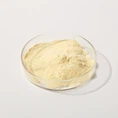The advantages of naturally fermented calcium propionate mainly include its safety, antibacterial effect, environmental friendliness and effectiveness in specific applications.
First of all, safety is an important advantage of naturally fermented calcium propionate. Calcium propionate is a safe and reliable antifungal agent for food and feed. It has been approved by FAO/WHO, which means that its application in food and feed is safe. In addition, after calcium propionate enters the body of cows, it can be hydrolyzed into propionic acid and calcium ions, which can be absorbed through metabolism. This process is safe for cows and other animals.
Secondly, in terms of antibacterial effect, calcium propionate decomposes into propionic acid under acidic conditions, which has a significant antibacterial effect. Propionic acid can create high osmotic pressure around mold cells, causing dehydration of the mold cells and thus inhibiting their growth. In addition, the H+ dissociated from propionic acid can penetrate the mold cell wall, inhibit the activity of intracellular enzymes, and hinder the reproduction of mold. This antimicrobial mechanism makes calcium propionate very effective in preventing mold in food and feed.
Third, environmental friendliness is also an advantage of naturally fermented calcium propionate. Compared with other antifungal agents, calcium propionate is non-volatile, resistant to high temperatures and less irritating, making it suitable for long-term storage of feed products. In addition, calcium propionate decomposes into propionic acid under acidic conditions, and propionic acid is a product of the oxidation of amino acids and fatty acids in the human body, so it is considered a very safe preservative.
Finally, in terms of "effects in specific applications", calcium propionate can play a preservative role in bread and pastries, especially in an environment with a lower pH value, its preservative effect is higher.
In feed, calcium propionate can not only effectively inhibit the growth of mold and bacteria, but also improve the fermentation quality and aerobic stability of feed.
In addition, in dairy cow feeding, calcium propionate can supplement calcium ions, prevent milk fever, improve blood sugar levels, reduce the risk of ketosis, and relieve heat stress.




